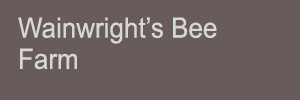

Our Story
Our story starts back in 1974 when I got my first hive of bees. Since then the bees have grown to 750 colonies in numerous apiaries across Wales and England, producing many different types of honey. Today, we supply not only honey from our own hives but also honey and beeswax from Africa.
In 1983 I went to Zambia as a volunteer working with traditional bark hive beekeepers in the forests of North West Province. After a few years, production of honey had outstripped local demand and we began exporting to Europe. When I returned to the UK in 1989 I set up Tropical Forest Products: we were the first company to import organic honey and beeswax from Africa and we have been doing this ever since. Shoppers love the taste of our honey, which has been on sale for years in some of the best quality supermarkets in the UK. Nowadays we import honey and beeswax from forest beekeepers in Zambia, Ethiopia and Cameroon. African honey has a rich flavour, different to the more floral UK and European honeys. This flavour comes from the many species of nectar-producing trees in the African forests.
Not only is African honey delicious, our development work makes a real and lasting change to the livelihoods of beekeepers and their families, and ensures the continued protection of the forest by the local communities who benefit from them.
Take a look at the photo stories we have prepared to get a flavour of the forest and the beekeepers’ way of life.
The vast number of bees thriving in the African forests, coupled with traditional beekeeping methods, produces a lot of organic beeswax, free from pesticide or veterinary medicine residues. We refine this beeswax and supply cosmetic and other industrial users. We also supply many specialist varieties of honey in bulk to industrial users.
Here in the UK, at Wainwright’s Bee Farm, we are busy tending our bees in Wales and England. Starting in May we raise queens from our selected breeder mothers and make hundreds of nuclei colonies, small hives that will grow to become the honey producers during the following summer. It is a very intense few months where a change in the weather can spell gloom or else joy if the sun shines and the bees prosper.
Hopefully, by the end of the season in September, we have a good crop of many different types of honey: Welsh summer honey from blackberry and willowherb, Shropshire spring honey from rapeseed and field beans, lime honey from Wiltshire, summer wildflower honey from Salisbury Plain, borage honey from Essex and, the last crop, heather honey from the Welsh mountains.
Thanks for taking the time to look at our web site,
David Wainwright
Director and beekeeper


